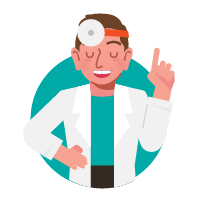It is essential to conduct comprehensive eye exams for maintaining ocular health as well as monitoring for signs of eye disease, injury, allergy, infection, and visual motor deficits. In addition, it is important to know how often you should have your eyes examined by an eye doctor.
How often does your child need to have a comprehensive eye exam?
Infants should be seen once between the ages of six and twelve months, and if everything is normal, then they should be seen again between the ages of three and five, just before they enter school. Then they should be seen again right before the first grade between the ages of six and seven. As long as everything is normal, your child only needs to see their eye doctor once a year.
In the event they do have an issue, for example, if they are enrolled in the myopia management program that tries to slow down their minus prescription, then that warrants a different follow-up based on which treatment they choose. In the case of binocularity issues, your child may require vision therapy. Vision therapy sessions are typically scheduled every week. Therefore, based on what the eye doctor finds, you should visit your eye doctor as often as recommended.
How often does an adult need to have a comprehensive eye exam?
If an adult is completely healthy, has no changes to their prescription, has no specific risk factors or any symptoms, then they can be seen at least once every one to two years. However, if they have specific risk factors, such as a family history of eye conditions like macular degeneration, glaucoma, or blindness, or if they are taking prescription medications with side effects that may manifest in the eye, then they may require more attention from an eye doctor.
An adult with diabetes may need to see an eye doctor every six months or every three to four months, depending on the severity of their condition. It may be necessary for them to have a dilated fundus exam every six months if they have a family history of macular degeneration. The answer really depends on the risk factors, their age, and their overall health. If they have sudden changes in their vision or if they have double vision or if they feel like something is in their eye, and they suffer from a lot of pain, sensitivity and swelling, then that's considered an emergency visit, and they should see their eye doctor as soon as possible.
What is a comprehensive eye exam?
A vision screening or refraction is a basic evaluation of your vision to determine if you need a prescription or to update your prescription. A comprehensive eye exam is a more thorough evaluation that is both checking you vision as well as assessing your ocular health and comfort, in that way it is similar to an annual check up at your GP.
A comprehensive eye exam typically includes tests to measure visual acuity (sharpness of vision) and check for refractive errors (such as nearsightedness, farsightedness, and astigmatism). It also includes an eye health examination, during which the eye doctor checks the overall health of the eye and surrounding tissue.
A comprehensive eye exam also includes additional tests and evaluations to assess the overall health of the visual system. This may include tests to evaluate eye movement and coordination, assess the health of the retina, optic nerve, and other structures in the back of the eye, and check for the presence of any eye diseases or disorders. During a comprehensive eye exam our eye doctor will also discuss symptoms that may impact your quality of life such as difficulty driving at night, dry eye, eye allergies, among many other topics.











